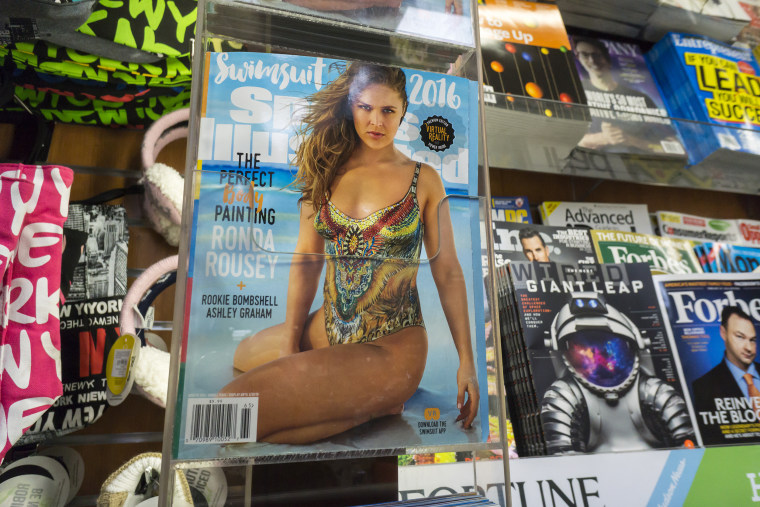LOS ANGELES — Sports Illustrated over the decades has chronicled stellar match-ups, blow-outs, squeakers, sudden deaths and photo finishes. Now it's getting ready to take on a whole new kind of game.
Publisher Meredith Corp. has sold for $110 million the intellectual property around the venerable sports-news outlet to Authentic Brands Group, the brand-development company that manages Juicy Couture, Nautica, and elements of the Muhammad Ali and Elvis Presley estates, among others. Meredith took on Sports Illustrated as part of its purchase of Time Inc. in January of 2018 for $1.85 billion plus debt.
Under terms of the deal, Authentic Brands acquires the rights to market, develop and license Sports Illustrated and its kids' edition as well as its swimsuit and "Sportsperson of the Year" franchises, along with the magazine's photo archive. Meredith will pay a licensing fee to operate the editorial operations of Sports Illustrated in print and in digital for a minimum of two years. Editor Chris Stone and Publisher Danny Lee will continue to lead Sports Illustrated at Meredith.
"We felt this was the best outcome for the brand, and gave it the greatest future growth potential," says Jon Werther, president of Meredith's national media group, in an interview. With the new pact as a foundation, he says, Meredith can move to sell ads for Sports Illustrated along with its other media holdings. The company had kept the magazine separate from its other properties because of its hopes for a sale. Meredith has no plans to change the magazine's frequency, Werther says, or the circulation it guarantees advertisers.
The pact suggests owners of long-standing print-focused brands may find monetizing non-core assets easier than the traditional business. As audiences migrate to digital screens - and advertisers follow them - wringing profit from magazines and newspapers continues to be a difficult task. SI's overall print and digital audience for March was off by 9.2%, according to the Association of Magazine Media, a trade organization.
But the brand's new owner expects to forge into new areas. "Sports Illustrated is not just a magazine. It's really a platform and it really stands for something that is hard - when you're building brands - to get: It has authenticity. It has authority. It has respect," says Jamie Salter, founder, chairman and CEO of Authentic Brands, in an interview. "To earn that with a consumer, it's not easy, right? Consumers are tough."
In a wide-ranging discussion, Salter envisioned possibilities ranging from Sports Illustrated medical clinics and sports-skills training classes to a gambling business and better use of the magazine's vast photo library. "We always stay close to the DNA and the heritage of the brand," he says. "Granted, we will go beyond, but we will always remember sort of how we go there."
Known since 1954 as a gold standard for sports journalism, Sports Illustrated has over the years vied with an array of upstarts, most notably Walt Disney's ESPN, which was able to create a TV-and-video business for sports coverage that SI's previous owner, Time Warner, was not. The market for sports journalism and discussion around it has fragmented further in the digital age, with the rise of sites such as WarnerMedia's Bleacher Report; Bill Simmons' The Ringer; The Chernin Group's Barstool Sports; and the independent Awful Announcing. Indeed, ESPN said in April it would shut down its flagship print magazine, which was no longer profitable.
The sale moves Meredith close to the end of its effort to sell various Time Inc. assets, once some of the biggest media brands in the sector. Meredith has sold Time and Fortune to entrepreneurs, while folding Money's print operations. The company is still working to sell Fansided, a network of sports and entertainment sites, according to a person familiar with the matter and is seeing offers in the $30 million range for the property.
